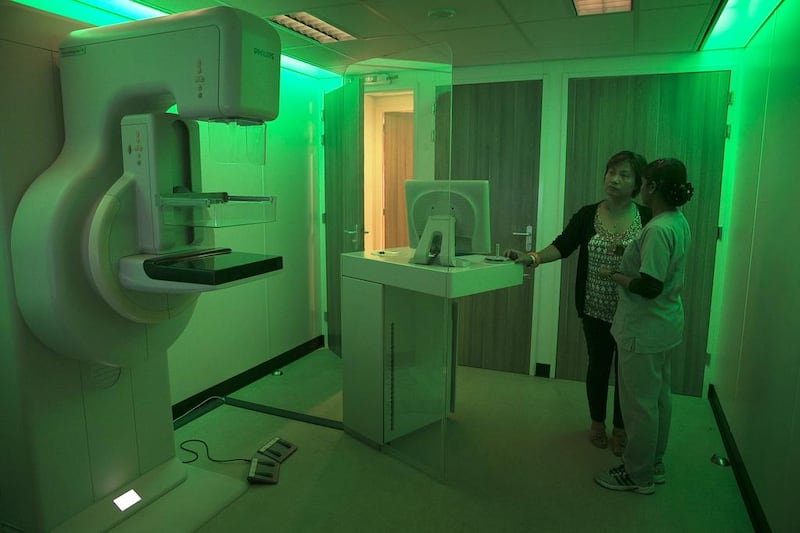DUBAI // A lack of training in breast cancer detection could be a factor in late diagnosis, experts say.
Radiologists can specialise in the detection of breast cancer and understanding the nuances of the disease at its various stages, but the UAE lacks such skills although breast cancer is the most common cancer in the country.
“Radiologists here need training,” said Dr Laszlo Tabar, professor of radiology at Falun Central Hospital in Sweden, who has spent more than 40 years studying breast cancer and has trained medical professionals in the region.
“I would recommend UAE leaders to build places of excellence that have all the tests and the technology needed for screening and diagnosis. ”
As breast cancer is a multifaceted disease, doctors needed to use a similar approach, said Dr Tabar, who recently led a mammography training course organised by Fujifilm at the Iranian Hospital in Dubai.
“As long as these machines are in radiology departments and general radiology staff are using it, it’s not of much use,” said Dr Tabar. “It’s very important that one trains radiologists who are ‘super-specialists’.”
Most breast cancer cases in the region are detected at very advanced stages, and lack of training can result in accidents, Dr Tabar said.
“Breast radiology is a very specialised subset within radiology,” he said. “You know that a radiologist is not sure of what he is looking at, and that’s why there are false positive results.”
Dr Asma Khammas, a specialist in radiology at the Ministry of Health, said that “for a long time, breast images have been read by general radiologists”.
“Lately, we have understood that this should only be read by radiologists trained on breast pathology,” said Dr Khammas, who is also head of the imaging unit in Fujairah and imager at the ministry’s National Breast Screening Programme.
“I think we need to build local expertise in the field through hosting conference and training sessions, where world experts are invited to come and share their knowledge.”
She agreed that breast cancer in most UAE patients is detected very late, though awareness about the importance of early detection has grown with health campaigns.
Dr Khammas believed breast cancer screening should take place in specialised centres.
“If you ask a healthy, asymptomatic woman to come to a hospital, they don’t accept it. But if you design a specialised centre and send invitations, and having the latest technology on breast cancer screening in one place, this would help,” said Dr Khammas.
There are specialised centres in Ras Al Khaimah and Tawam Hospital.
The Ministry of Health has launched two centres in Sharjah and another on the east coast.
“We need more of these,” said Dr Khammas.
Dr Rania Refaat, specialist in radio diagnosis at Burjeel Hopsital, agreed that training radiologists to detect breast cancer early is important, otherwise they could confuse benign lesions with cancer.
“We have annual training and go to seminars to learn about the latest in breast cancer diagnosis and management,” said Dr Refaat, adding that the incidence of breast cancer in women under age 40 is on the rise.
“In Arab countries, breast cancer presents almost 10 years younger than in USA and Europe. Moreover, half of these cases are under 50 years of age.”
Breast cancer affects one in five people in the UAE, according to the Health Authority Abu Dhabi.
Many other factors, such as social stigma, cultural issues and a lack of awareness were blamed for late detection.
arizvi2@thenational.ae






